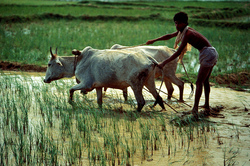
Financial Express (Dhaka) | 11 May 2011
Shamsul Huq Zahid
The global food crisis of 2007 and 2008 had forced many governments of food deficit countries to redesign their food security strategies. And as a part of that strategy, they fixed their eyes on countries having unexploited or under-utilized vast tracts of fertile arable land as sources of food supply.
Even affluent nations found it hard to import food for their populations as a number of countries, including India, Russia, Argentina and Vietnam, imposed ban on export of food grains in 2007 and 2008 when food prices in the international market had gone all-time high.
Land acquisition is not an entirely new phenomenon. The 19th century colonialism was all about taking control over land in other countries. And western food companies have owned or leased land in other countries for many years.
But following the food and fuel prices shocks in 2007-08, less traditional actors -- companies from countries like China, Saudi Arabia, and South Korea -- have entered the race for growing food or fuel crops.
State-owned or private investors from wealthy Arab and Southeast Asian countries, including Japan and South Korea and China, are now approaching many poor Southeast Asian and African nations in their quest for building up cooperative activities in the agriculture sector.
In 2008, Kuwait, Qatar, South Korea, Indonesia and the Philippines opened formal talks with Cambodia to have access to the latter's large tracts of agricultural land. Kuwait and Qatar in particular offered attractive aid packages to Cambodia for developing its agricultural infrastructures. Besides, high oil prices in 2007 and 2008 triggered further interest among the private sector to acquire land for growing energy crops.
Many investment banks, hurt by the crisis in the banking and property sectors, which were looking for new sources of investment outside the banking and property sector, saw opportunities in agricultural land markets, expecting the value of both food and fertile land to increase.
Bangladesh, itself an agrarian economy, also had faced serious situation emanating from unabated hike in food prices and narrowing of sources of food import. The crisis was so acute that a couple of countries reneged on their deals to export rice to Bangladesh in 2008.
Despite the fact the country is yet to tap the full production potential of its own arable land due to a host of factors, the policymakers, keeping in view the future food need of an ever increasing population, also started looking outward for taking lease of agricultural land. It had first approached neighbouring Myanmar which has vast tracts of fallow arable land. But after showing some interest initially, Myanmar authorities turned lukewarm.
Bangladesh then had set its eye on distant African land where millions of hectares of land have remained either fallow or highly under-utilised for decades after decades.
A high-profile official team recently visited a number of African countries to explore scopes for sending Bangladesh manpower and expand areas of cooperation in various fields, including agriculture.
The newly appointed ambassador of Bangladesh to Kenya prior to his departure for that country called on President Zillur Rahman last Monday and broke a piece of good news -- Kenya and Uganda have agreed to lease their land to Bangladesh government for farming. Kenya will offer land on lease for 99 years at a cheap price of 99 cents per bigha annually while Uganda wanted 20 per cent of the produce, no annual fees.
No agreement between Bangladesh and two African nations have been signed yet. Prior to signing of the agreements, the policymakers here would have to examine a lot of issues, including those relating to sending of farmhands there and their security, input prices and the ways to bring home the farm goods produced in these countries.
Recently, Brazil, Russia, Ukraine and Australia have offered their agricultural land to foreign investors. So, rich Arab and South Asian countries have better options before them to put in their money for the purpose of achieving food security. Bangladesh, for obvious reasons, would not be able to compete with those countries for taking lease of land in continents other than Africa.
However, the issue of land acquisition in poor developing countries, particularly in Africa, has already raised global concern. Some international institutions have pointed out the possible clash of interests between foreign companies and the indigenous population. Some even has termed the acquisition of foreign land as 'land grabbing'.
Madagascar President Marc Ravalomanana was forced to resign in early 2009 in the face of popular anger sparked largely by an agreement he had concluded to lease a huge area of arable land to South Korea's Daewoo Logistics, which wanted to grow maize and bio-fuels.
So, going to a distant land for the sake of food security would not be as easy as it is perceived here. The current murmur over what is being described as 'land grabbing' might one day end up in full-blown crisis particularly in the case of poor developing countries.
[email protected]












